How Do We Really Build a Better Teacher?
A MiddleWeb Blog
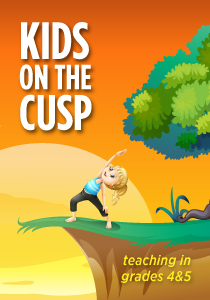 I sat down last weekend to write a draft for a new Kids on the Cusp post. I couldn’t get started. I couldn’t pick a topic. It wasn’t writer’s block. There were just too many topics swirling around in my head.
I sat down last weekend to write a draft for a new Kids on the Cusp post. I couldn’t get started. I couldn’t pick a topic. It wasn’t writer’s block. There were just too many topics swirling around in my head.
I decided to walk away for a moment and finally sort through my summer pool bag, still sitting in the corner filled with magazines and articles I’d planned to read (but never actually did) this summer.
The first magazine I took out from my bag of good intentions had been in there for quite some time. It was the March issue of The New York Times Magazine – from 2010. (You can probably relate.)
The NYTM cover read, Building a Better Teacher. The subtitle asked, “Can Educators Be Educated About How to Educate?” Written by Elizabeth Green, it poses a complicated question, as evidenced by the 8,000 words Green devotes to exploring possible answers (with a strong focus on the ideas of educator Doug Lemov, author of the Teach Like a Champion books).
I decided there was no time like the present to read it. Reading it gave me a valid excuse to put off the ridiculous amount of school-related paperwork staring at me from a different corner of the living room.
So what can we learn about teacher-building?
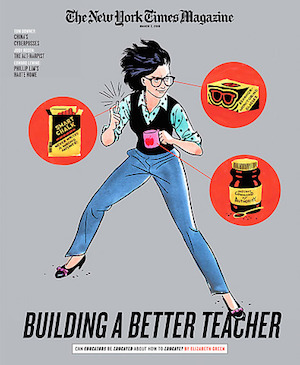
Sometimes I feel like this woman, prepared and ready for whatever enters the classroom on any given day. Like her, I wear reading glasses, but the view from behind my lenses doesn’t resemble the image on page 30 of the magazine.
In the magazine not a single student in the picture is smiling. Not a single student is truly engaged. It is not a pretty picture of a “typical classroom.” It is not the picture I see each day walking in and out of the classrooms of my friends and colleagues. The view from behind my glasses, as a matter of fact, is drastically different. I witness many moments of uncaptured magic, and these moments inspire me.
Green asks, “Can Educators Be Educated About How to Educate?” Yes, they can. And we can do it for ourselves.
I know this for a fact. I learn more each day about how to be a better teacher by watching other teachers in my school. I hone my own teaching skills from observing other skilled educators cope with the crazy stuff, inspire the kids, and teach in new and different ways.
I observe them being dragged down and disheartened too, mostly by administrative demands that eat away the time we have to do the important part of our job…the actual teaching.
Defining good teaching
When one of my students asks a “thick question” like the one mentioned in Green’s article, I encourage them to do a little research into the topic. So, I thought, maybe this article will give me some insight (and possibly a topic to write about). I needed to practice what I preach…or more precisely, practice what I teach.

“Building a Better Teacher” was not only a lesson in the history of teacher training practices, it also gave me much pause for thought as it tried to define what makes a good teacher. I ask myself that question on a daily basis.
The teaching theory and academic aspects of teaching offered in grad school were quite helpful in my quest to become a good teacher. But it is the time INSIDE the classroom that has taught me the most.
That’s the laboratory where I conduct my experiments, where I really find out what works (and what doesn’t) for me personally, and, as an extension, what works for my students. Great teachers come in all shapes and sizes.
Green’s article, aside from giving me knowledge about the circumstances, politics, and pendulum swings in education as well as the statistical models for evaluating teacher success, helped me understand that I am, in fact, a darned good teacher.
Her article also made me realize that I know very little about the history of teacher training and how policies are made. And how ill-informed I am about the politics that are deconstructing the art of teaching.
The kind of PD we need more of
One of the building blocks discussed in Green’s article was the use of video as a tool for professional development. Videotaping real teachers in the real world is an opportunity to take an anthropological look at the teacher in his or her natural habitat. It’s laboratory observation. It’s helpful. It’s valid. It’s inspiring. It’s humbling.
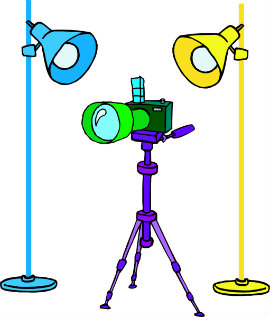
Yet the benefits of teachers learning from each other, from seeing each other in action, whether we are armed with “Instant Command of Authority,” “Smart Chalk,” or donning our magical “Behavior-Monitoring Glasses,” seem obvious.
I wish we could start using more of this anthropological approach to professional development in my district. Instead, we are often required to attend large-group, lecture-based professional development sessions twice a year.
Left to my own devices, I would spend my “professional development hours” observing other teachers in action, watching Teacher Channel videos, reading articles about new and exciting ways to improve my teaching, spreading out files and individual student data (in an empty, quiet classroom or on my living room rug) in an effort to identify my current classes’ individual needs and to plan small group instruction.
At home, I am often left to my own devices, and they are spread out each weekend on my living room floor. I AM learning and growing as an educator. I AM making an effort to research and incorporate teaching practices that affect our current system of education. This particular type of professional development doesn’t count toward our state requirements for twenty hours of PD each year, though. That’s a shame.
Build us up, don’t tear us down
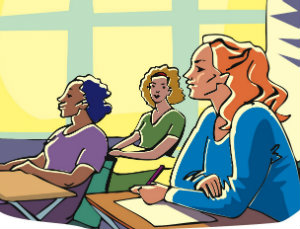
Attending mandatory workshops and completing piles of paperwork do not build a better teacher. They have the exact opposite effect on the teachers I see hustling through the halls during the daily, 30 to 45 minute prep period allotted to each of them.
I’m taking my own bottle of Do Your Best
Thankfully, I also found a desperately needed a can of “Do the Best You Can, Mary” at the bottom of my pool bag. I’m going to take it to our next required in-service day. I’ll try to go in with an open mind…and a can opener.
Here are some “anthropological videos,” if you’d like to join in:
► Teaching Channel (lots of teachers teaching well)
► Teaching History’s Teaching in Action
► Teach Like a Champion – Sample Videos
► The Best Funny Movie/TV Clips Of Bad Teachers (These are sadly classic!)

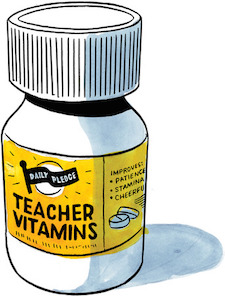


































Sadly, the words you write are right on target here in Florida as well. We have so much “stuff” to do I cannot prep for my daily lessons unless it is on my own time.
It is sad, JoAnn…I really do enjoy planning lessons at home, where it’s quiet and away from the clatter of a school, but it sure does take a chunk out of my week nights and weekends!..When I close that classroom door though, all the other outside crazy goes away for a while.